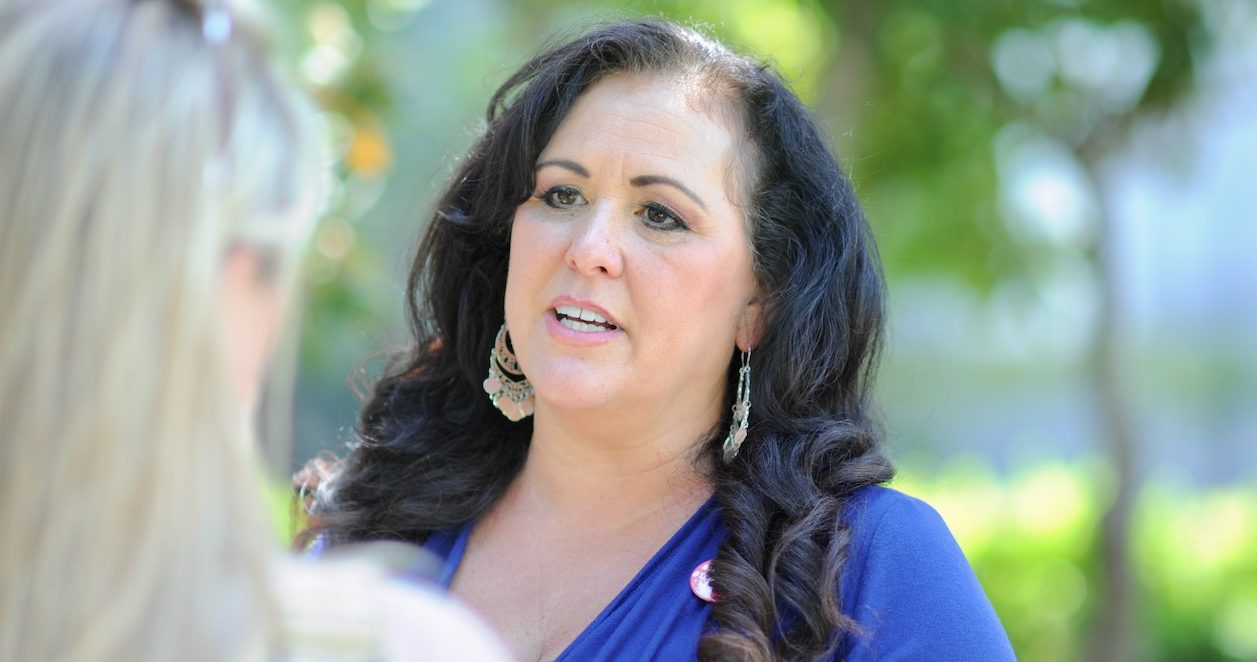
Assemblywoman Wendy Carrillo. (Photo: Kevin Sanders for California Globe)
AB 1179 Would Require Employer-Provided Backup Childcare
Supporting access to childcare could save employers money on lost revenue associated with attrition due to childcare obstacles
By Chris Micheli, March 15, 2021 5:42 pm
Assemblywoman Wendy Carrillo (D-Los Angeles) introduced Assembly Bill 1179 to require employer-provided backup childcare. The bill would add Article 6 (commencing with Section 2950) to Chapter 2 of Division 3 of the Labor Code.
Section One of the bill would provide seven legislative findings and declarations regarding the number of parents in this state with young children, the impact of childcare issues on workers, that inadequate backup childcare is one of the top reasons that women drop out of the workforce, and that few companies offer any backup childcare as a net benefit.
In addition, supporting access to childcare could save employers money on lost revenue associated with attrition due to childcare obstacles. Finally, in order to support working families and protect children, the Legislature intends to require certain employers to make backup childcare available to their employees as an employment benefit.
Section Two of the bill would add Article 6, which would be titled “Backup Childcare Benefit.” A California employer would be required to provide paid backup childcare as a direct benefit to their eligible employees. Employers would be allowed to provide the backup childcare benefit as follows:
- By contracting with a licensed childcare provider and providing direct payments to the licensed provider for the hours used by the employee.
- Directly paying a qualified backup childcare provider upon receipt of an invoice detailing the number of hours used by the employee.
- By reimbursing an employee for up to 60 hours for backup childcare paid by the employee.
In addition, AB 1179 would provide definitions for the following terms:
- “Backup childcare” would mean childcare provided by a qualified backup childcare provider to the employee’s child when the employee’s regular childcare provider cannot be utilized.
- “Employee” would not include employees covered by a valid collective bargaining agreement, employees in the construction industry covered by a valid collective bargaining agreement, individuals employed by an air carrier as a flight deck or cabin crew member, as well as employees of the state, city, county, city and county, district, or any other public entity.
- “Employer” would mean any person employing another under any appointment or contract of hire, and includes private employers with 1,000 or more employees, the state, political subdivisions of the state, and municipalities, including charter cities.
- “Family member” would mean any of the following:
- A child regardless of age or dependency status.
- A biological, adoptive, or foster parent, stepparent, or legal guardian of an employee or the employee’s spouse or registered domestic partner.
- A spouse.
- A registered domestic partner.
- A grandparent.
- A grandchild.
- A sibling.
- “Health care provider” has the same meaning provided in the Government Code
- “Paid backup childcare” or “paid backup childcare benefit” would mean an employee benefit consisting of the employer paying for a qualified backup childcare provider to provide backup childcare for an employee’s child that is compensated at the state minimum wage or the federal minimum wage, whichever is higher.
- “Qualified backup childcare providers” would mean either of the following:
- Licensed childcare providers licensed by the State Department of Social Services.
- License-exempt childcare providers.
AB 1179 would also provide that an employee who, on or after January 1, 2022, works in California for the same employer for 30 or more days within a year from the commencement of employment is entitled to paid backup childcare benefits. Employees would accrue the paid backup childcare benefit at the rate of not less than one hour per every 34 hours worked, beginning at the commencement of employment or the operative date of this article, whichever is later.
For employees who are exempt from overtime requirements as an administrative, executive, or professional employee under a wage order of the Industrial Welfare Commission would be deemed to work 40 hours per workweek for the purposes of this section, unless the employee’s normal workweek is less than 40 hours, in which case the employee would accrue backup childcare benefits based upon that normal workweek. An employer may use a different accrual method as well as satisfy the accrual requirements of this section by providing not less than 60 hours of backup childcare benefits.
Under AB 1179, an employee would be entitled to use accrued paid childcare beginning on the 90th day of employment, after which day the employee may use paid backup childcare benefit hours as they are accrued. Accrued paid childcare would carry over to the following year of employment.
However, an employer may limit an employee’s use of the accrued paid backup childcare benefits to 60 hours in each year of employment, calendar year, or 12-month period. An employer is not required to provide additional paid backup childcare benefits pursuant to this section if the employer has a paid childcare policy that makes available an amount of leave applicable to employees that may be used for the same purposes and under the same conditions as specified in this section.
In addition, an employer is not required to provide compensation to an employee for accrued, unused paid backup childcare benefits upon termination, resignation, retirement, or other separation from employment, unless the rehire occurs within one from the date of separation. An employer would also be required to provide an employee with written notice that sets forth the amount of paid backup childcare benefits available for use on either the employee’s itemized wage statement or in a separate writing provided on the designated pay date with the employee’s payment of wages.
While an employee may determine the amount of the paid backup childcare benefits that they need to use, an employer may set a reasonable minimum increment, not to exceed two hours, for the use of the paid backup childcare benefit. An employer would be required to calculate the paid backup childcare benefit using one of the three specified calculations.
Under AB 1179, an employer would be required to provide payment for backup childcare no later than the payday for the next regular payroll period after the backup childcare was used. In addition, an employer would be required to keep for at least three years records documenting the hours worked and paid backup childcare benefits accrued and used by an employee. There would be access to these records by the state and employees, and a presumption against the employer for failure to maintain adequate records.
Note that his new section of the Labor Code would preempt any local ordinance to the contrary. This new article does not limit or affect any laws guaranteeing the privacy of health information, or information related to domestic violence or sexual assault, regarding an employee or employee’s family member. Moreover, this article should not be construed to discourage or prohibit an employer from the adoption or retention of a paid backup childcare benefit policy more generous than the one required herein.
Moreover, this article would not lessen the obligation of an employer to comply with a contract, collective bargaining agreement, employment benefit plan, or other agreement providing more generous paid backup childcare benefits to an employee than required by this law. And, this article would establish minimum requirements pertaining to the paid backup childcare benefit.
This bill is expected to be heard in April in its first policy committee.
- Endangered Species Regulation - February 19, 2026
- Renewal of Judgments - February 18, 2026
- Hearings on Third-party Claims - February 18, 2026





I hear a stampede of the few remaining businesses leaving the state.
Really.
Great job killer. I think it should be funded with laid-off government workers as we downsize State government. We could easily cut out 75% across the board including upper management. Also, cut state taxes by 75% California has the highest state taxes in the united states. Several states don’t. have income state taxes. July 1st 2021 would be a good start.
It’s not the responsibility of employers to provide childcare to employees, Wendy…
If you can’t afford to take care of them, then don’t have them….
See how simple that is???
Another “required” edict from our mommies and daddies in Sacramento, telling us what’s good for us, and making us pay for it. No thanks. Stop having kids if your can’t afford to raise and educate them. It’s NOT someone else’s responsibility.
It’s so much to be generous with other people’s money.